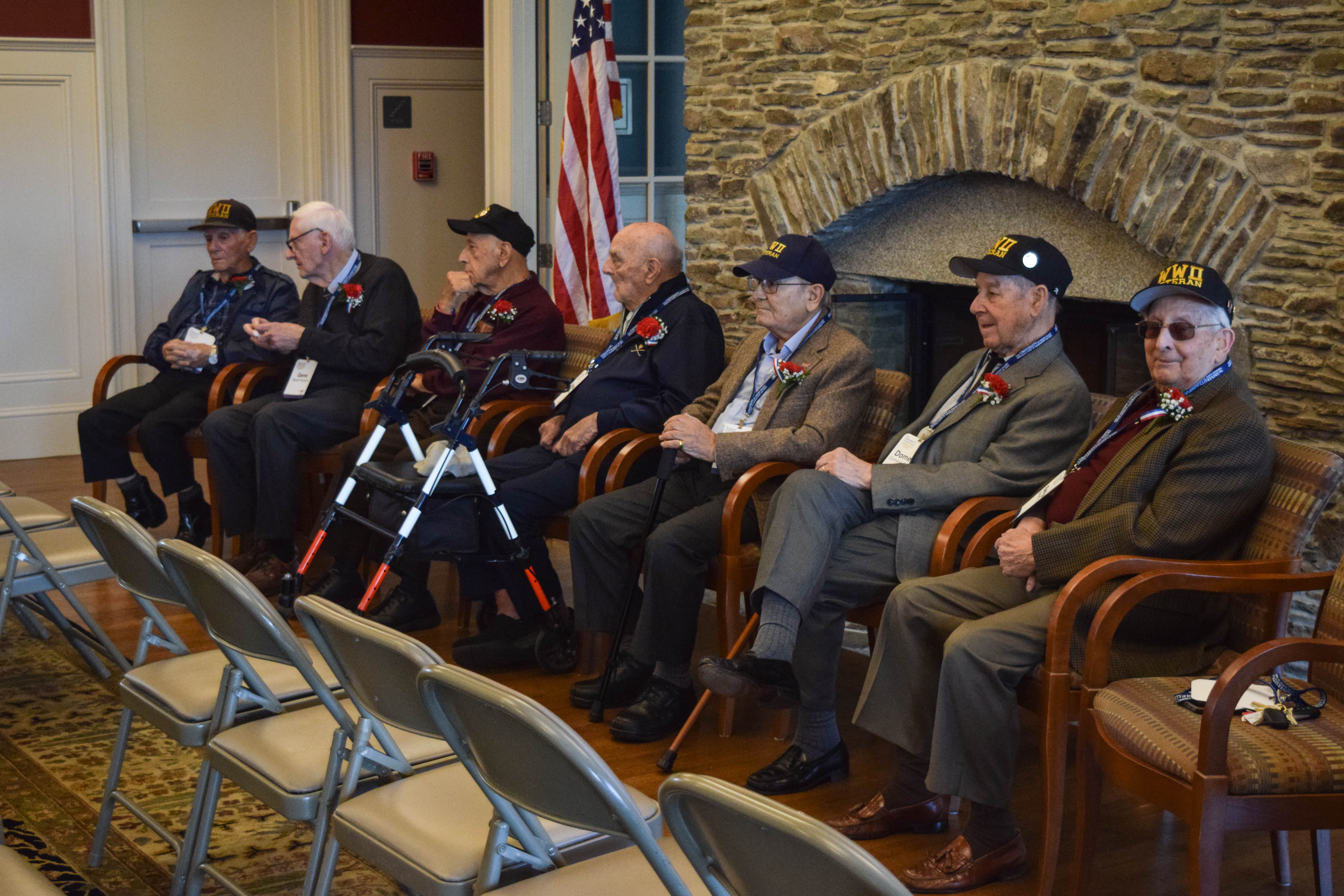Photo by Anna Meassick | Students in PRS 340 organized for six decorated WWII veterans to speak to the URI community.
On Friday, Nov. 9, the University of Rhode Island hosted six highly decorated World War II veterans in an interactive information session to retell history and share personal experiences.
The event was coordinated by Public Relations 340 students as part of a semester-long experiential learning project and began with a short speech by College of Arts and Sciences Dean Jeannette Riley, who welcomed the veterans to the University. Riley commented on the event’s representation of URI’s efforts to engage of students in situations they would experience when working in the real world.
Riley’s speech was followed by the Pledge of Allegiance and Brain Kuchar, a student in the University’s music department sang “God Bless America.”
Tim Gray, a documentary filmmaker and founder of the World War II foundation introduced the veterans and opened up the event to questions from audience members.
“You have a very rare opportunity today to witness history,” Gray said. “The men here have all played a small part in the collective victory that was World War II. These are the types of stories our foundation tried to preserve.”
One of the veterans, Benjamin Carbone, was a ball turret gunner in a B24 liberator who completed 50 combat missions. Carbone was a member of the air force team that destroyed the Ploesti Oil Field in Romania. According to Carbone, Hitler heavily depended on these oil fields, and the United States air force was instructed to destroy them at all costs. At the time, it was one of the most heavily defended areas in the world.
“Every time we went there, we lost 50 percent of our planes,” Carbone said. “We lost more planes on that one target then all the other targets. We lost 2,400 or 2,500 planes.”
Carbone was followed by Domenic Giarusso, a flight test engineer who was responsible for fixing all the major damages to aircrafts during bombing missions. Giarusso enlisted in the military while he was still in high school, and spoke about the transition from civilian life to military life.
“It was quite a transition,” Giarusso said. “We were coming out of the depression years and we were trying to establish ourselves here at home. All the sudden the war comes along and I felt I wanted to do my part so I went down and enlisted. Once you enlist, you do what you’re told, and you don’t ask questions. That was an adjustment right there.”
One of the veterans, Ernest Corvese, was on Omaha beach during D-Day. Corvese almost drowned, as he fell underwater carrying 60 pounds of TNT and a rifle. Someone pulled Corvese to the surface, but he could not find his crew.
Similar to Corvese, Richard Fazzio, another veteran in attendance at the event, enlisted at the age of 17 and was navigating a Higgins Boat at Omaha Beach on D-Day.
“Heading in there we could hear the bullets hitting up against the boat, and I right away I started thinking about my mother, and I kept praying,” Fazzio said. “I looked around and I saw soldiers getting picked off like fish in a barrel. They lowered the ramps a little too soon, and the soldiers were trying to walk into the beach and they were drowning. It was awful.”
The next soldier to speak was Armando Napoli, who hitchhiked from Rhode Island to California to join the Navy. Napoli was so intent on joining the service and putting his life on the line for the United States, that he was willing to do whatever was needed.
“My parents were immigrants, but they loved this country, and they supported me in serving my country,” Napoli said. “All I could do was join the service to put my life on the line for my country. I cannot thank the American public for being so understanding and so supportive all the time. I’m glad that with all my shipmates here that we participated and we were victorious.”
The final veteran to speak was Joseph Aquilante, who enlisted in the Air Force and served in Okinawa. Aquilante spoke about the responsibility he felt to join the military at the time of the war.
“We thought we were doing the job we had to do,” Aquilante said. “There was no such thing as a discharge date. I’m one of 10 kids, and I ended up in Okinawa.”
The event concluded with one audience member asking the veterans if they were 18 or 19 today, would they enlist and serve again. The veterans responded in a chorus of “absolutely.”

